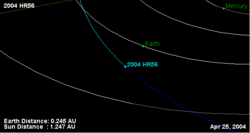2004 HR56
Topic: Astronomy
 From HandWiki - Reading time: 2 min
From HandWiki - Reading time: 2 min
 Orbital diagram of asteroid 2004 HR56 as of 25 April 2004 | |
| Discovery[1] | |
|---|---|
| Discovered by | Spacewatch |
| Discovery site | Kitt Peak National Obs. |
| Discovery date | 25 April 2004 |
| Designations | |
| 2004 HR56 | |
| Minor planet category | |
| Orbital characteristics[1] | |
| Epoch 26 April 2004 (JD 2453121.5) | |
| Uncertainty parameter 9 | |
| Observation arc | (3 days) |
| |{{{apsis}}}|helion}} | 2.2331 AU |
| |{{{apsis}}}|helion}} | 0.8772 AU |
| 1.5552 AU | |
| Eccentricity | 0.4359 |
| Orbital period | 1.94 yr (708 days) |
| Mean anomaly | 41.043° |
| Mean motion | 0° 30m 29.52s / day |
| Inclination | 5.9726° |
| Longitude of ascending node | 41.102° |
| 87.895° | |
| Earth MOID | 0.0601 AU (23.4 LD) |
| Physical characteristics | |
| Mean diameter | [2] |
| Absolute magnitude (H) | 23.3[1] |
2004 HR56, is a micro-asteroid, classified as near-Earth object belonging to the Apollo group. It was first observed by Spacewatch at Kitt Peak National Observatory on 25 April 2004.[3]
Description
2004 HR56 and was visible between 25 April 25 to 10 May 2005. This find was documented as part of the FMO Project and was reported by six different observatories. Reports indicate that the object is about 74 meters wide and has an absolute magnitude of 23.28. The object could also be classified as a meteoroid, although the most common definition uses a diameter of 10 m as the demarcation.
It orbits the Sun at a distance of 0.9–2.2 AU once every 23 months (708 days). Its orbit has an eccentricity of 0.44 and an inclination of 6° with respect to the ecliptic.[1]
References
- ↑ 1.0 1.1 1.2 1.3 1.4 "JPL Small-Body Database Browser: (2004 HR56)". Jet Propulsion Laboratory. https://ssd.jpl.nasa.gov/sbdb.cgi?sstr=3180185. Retrieved 25 January 2018.
- ↑ "Asteroid Size Estimator". CNEOS NASA/JPL. https://cneos.jpl.nasa.gov/tools/ast_size_est.html. Retrieved 25 January 2018.
- ↑ "2004 HR56". Minor Planet Center. http://www.minorplanetcenter.net/db_search/show_object?object_id=2004+HR56. Retrieved 25 January 2018.
External links
- MPEC 2004-H82 : 2004 HR56, Minor Planet Electronic Circular, 28 April 2004
- 2004 HR56 at NEODys-2
- Holmann Transfer Daily , News from 2 May 2004
- 2004 HR56 at NeoDyS-2, Near Earth Objects—Dynamic Site
- Ephemeris · Obs prediction · Orbital info · MOID · Proper elements · Obs info · Close · Physical info · NEOCC
- 2004 HR56 at ESA–space situational awareness
- 2004 HR56 at the JPL Small-Body Database
 |
 KSF
KSF